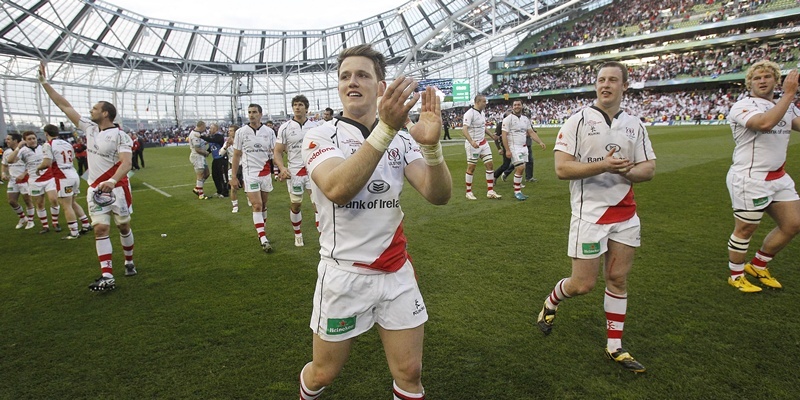Dublin on Saturday might look like just another of those galling, glorious defeats for Scottish rugby, but it should be vanguard of something far more than that.
The Heineken Cup final may have eluded them, but the real challenge for Edinburgh now is to stay on the march to being a consistent European force.
Nobody involved in the capital club was happy with the simple achievement of a semi-final, clearly shown in the frustration and disappointment of the coaching staff and players at Saturday’s 22-19 loss in Dublin to Ulster, a match that even allowing for the Scottish side’s considerable flaws on the day could well have been won.
But the achievement of reaching the last four on the budget that coach Michael Bradley had to deal with and, in his first season, without the chance to properly put his stamp on the team cannot be over-estimated.
Edinburgh’s Irishman is still operating largely on the shoestring given to him by former SRU chief executive Gordon McKie, his options dwarfed by Saturday’s opponents.
Reportedly 18 months ago Ulster were given a one-season windfall by the IRFU, allowing them to sign their expensive South African imports as well as All Black prop John Afoa, specifically for this assault on Europe.
Bradley’s sole notable signing was Sean Cox, a feisty lock who gave Edinburgh a bit of necessary backbone. But he bridged the gap by empowering youngsters like Grant Gilchrist, David Denton, Lee Jones Matt Scott and Tom Brown, by rejuvenating Fijian Netani Talei, almost a peripheral figure in his first season last year, and getting better big-game performances from his Scotland players in black and red than they showed in blue and white.
While the league campaign was effectively abandoned early on, Europe has proved the making of his team, and they were closer to the final than it appeared even before Jim Thompson’s late consolation try went up on the scoreboard.
Even with a combination of poor handling that saw the error count reach 13 and a complete disaster in the set scrummage, Edinburgh nearly won, and could even argue that three questionable refereeing decisions actually cost them victory.
Stephen Ferris, Ulster’s iconic flanker, got the benefit of a marginal call in the first few minutes when he baulked Tim Visser, and then a blatant one when he inexplicably escaped a sin-binning for a cynical obstruction as Edinburgh pressed near half-time.
There were reasonable questions whether the ball was out of the scrum before Pedrie Wannenburg scored Ulster’s only try.
But in truth, it was the scrummage where the game was lost and won.
It mattered not that Edinburgh were the more skilful and creative side, even that they put so much of their attacking ball on the ground; all but six of Ulster’s points came from their scrummage domination.
Even if Edinburgh fans point to the big imports like man-of-the-match Ruan Pienaar, there was no excuse to be found here; an all-native Ulster front row obliterated what was this Scotland’s first-choice Six Nations trio.
It might have just been a bad day Edinburgh coped well enough with Toulouse in this area in the quarter-final but it happens too often, in club or country colours, to be wholly an accident.
Photo by Julien Behal/PA Wire
